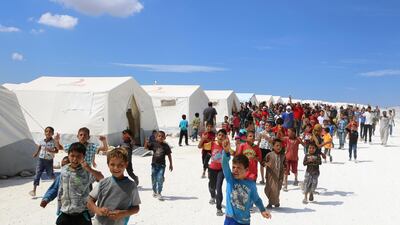As the people of Idlib province and the displaced who moved there to escape mayhem elsewhere in Syria tremble in anticipation of the onslaught many expect to bring an end to the seven-year conflict, some among them must certainly wonder, what has the bloodshed accomplished? When it is over, not only will more than half a million people have died but more than six million will have been made refugees and more than twice that will have required some form of humanitarian assistance. And when it is over, an Assad will most likely rule over Syria, as has been true since 1971, leaving the family well-positioned to celebrate the 50th anniversary of their brutal reign over the country in just three years.
An article in the New York Times this week discussed the state of affairs in Afghanistan. It noted that while the US government claims the Taliban control or contest "only" 44 per cent of the districts in Afghanistan, military analysts suggest the figure is actually closer to 61 per cent of the districts.
The article went on to note that the US has spent $860 billion on the conflict there and that 2,200 American soldiers' lives have been lost. But estimates of total deaths claimed directly or indirectly by the 17-year conflict range from 110,000 to as many as 360,000.
Recently, there have been some positive rumblings about peace talks in that country as well, talks that seem likely, given the situation on the ground where effective control of much of the country is back in the hands of the Taliban, as it was when the war was initiated in the wake of the 9/11 attacks on the US. From 1996 until that point, the Taliban controlled about three-quarters of Afghanistan. Once again, there has been an extraordinarily high price and precious little meaningful change.
Over the weekend, yet another Palestinian was gunned down by Israeli snipers for throwing rocks at troops from the Israeli Defence Forces. As tragic and indefensibly inhumane as this is, it is nothing new. In fact, it echoes similar incidents throughout the past several decades, especially since the beginning of the first intifada in 1987.
In the past few weeks, measures by the US to cut off aid to Palestinians by cutting funding to the UN agency supporting refugees and East Jerusalem hospitals are clearly designed to punish and pressure them for not going along with recent US-led initiatives. Efforts at a negotiated solution to the Israel-Palestinian stand-off are faltering once again, much as they always seem to do. Even Donald Trump has had to admit, contrary to his usual bluster and bravado and his past statements, that bringing peace to that part of the world could be very difficult to do indeed.
_______________
Read more from David Rothkopf:
The competition to fill an America-shaped hole will determine the future
Russia will emerge from US-Turkey fallout an even more potent actor
Cyber warfare: The dawn of a new era for which we are thoroughly ill-prepared
_______________
Even in one area in which progress had apparently been made in recent years, the steps that had been taken to contain the progress of Iran’s nuclear programme seem on the verge of becoming undone with suggestions in recent days that Tehran might pull out of the deal that ratified that progress, following the US unilateral pullout earlier this year. In Iran, after years of devastating war, the divisions that have bedeviled that country for decades and the competition for influence within that country continue.
Al Qaeda has not gone. It has moved and reconstituted itself. ISIS has been defeated for the moment but it has not gone either. Revolutions and attempted revolutions have taken place and yet have resulted in precious little meaningful change for the people of those countries. And in a number of places in the region, the situation is much, much worse.
The by-product of decades of war and unrest and death and brutality is more of the same. We might, in fact, look back on the past quarter-century as a period of lost opportunity for the vast majority of people in the Middle East. As technological advancements have opened extraordinary opportunities for regions like Asia that have been transformed in this period, large tracts of the Middle East have struggled or worse. For a generation, even for those not directly touched by the conflicts, the opportunities of a lifetime have been largely lost.
But for the region as a whole and for the world, this moment of setbacks and returns to the status quo and of heartbreak and tragedy should be seen for what it is – a warning that without meaningful change, without a new kind of leadership, a new generation born in this century will suffer the same fate as their parents. Nothing cries out for the importance of change like the implacable reality of decades of bloody repetition.
Pockets of hope that have seen economic and social growth, like the UAE, have a vital role to play in this. What should be clear to all however, is that the approaches of the past three or four decades to solving this region’s problems have largely failed and done so at a shattering cost. New leaders and new ideas and a recognition that change is vital are the messages we should hear as we listen to what are certain to be the tragic stories that filter out of Idlib in the days and weeks ahead.
David Rothkopf is CEO of The Rothkopf Group, a visiting scholar at the Carnegie Endowment for International Peace and author of The Great Questions of Tomorrow

